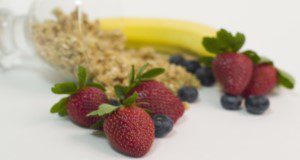La pérdida de peso puede ser un desafío. Comenzar una dieta restrictiva puede ser agotador emocionalmente y difícil de cumplir. ¿Hay alguna forma más efectiva de perder peso? ¿El momento y la frecuencia de las comidas ayudan a perder peso? Esta publicación describe los beneficios y riesgos del ayuno intermitente para bajar de peso.
This new 4-page article is the Spanish language translation of FSHN20-47/FS409, Popular Diets: Intermittent Fasting, written by Michelle Yavelow, Daniela Rivero-Mendoza, and Wendy Dahl, translated by Daniela Rivero-Mendoza, and published by the UF/IFAS Food Science and Human Nutrition Department.
https://edis.ifas.ufl.edu/fs417
Tag: Diets and dieting
Popular Diets: Intermittent Fasting
Weight loss can be challenging. Starting a restrictive diet can be emotionally draining and difficult to adhere to. Is there a more effective way to lose weight? Does the timing and frequency of meals help to lose weight? This new 4-page publication of the UF/IFAS Food Science and Human Nutrition Department describes the benefits and risks of intermittent fasting for weight loss. Written by Michelle Yavelow, Daniela Rivero Mendoza, and Wendy Dahl.
https://edis.ifas.ufl.edu/fs409
Popular Diets: Raw Foods
The raw foods diet has its roots in a vegetarian movement dating back to the 1800s. As the name implies, a raw foods diet is a dietary pattern composed of mostly or completely raw, unprocessed foods. This new 3-page publication of the UF/IFAS Food Science and Human Nutrition Department explores the potential health benefits and risks of a raw foods diet. Written by Alexa Barad, Daniela Rivero-Mendoza, and Wendy Dahl.
https://edis.ifas.ufl.edu/fs404
Popular Diets: Ketogenic Diet
The ketogenic diet is a high-fat, very low carbohydrate diet. The first documented use of the ketogenic diet was in 1921 to treat epilepsy in children. In the past few years, the ketogenic diet has resurged in popularity as a potential means for weight loss. The ketogenic diet has become popular due to celebrity endorsement and social media influences. This new 4-page publication of the UF/IFAS Food Science and Human Nutrition Department explains the concepts behind this diet, explores the available menu, and examines whether this diet is safe and effective. Written by Kelsey Gemmill, Daniela Rivero-Mendoza, and Wendy Dahl.
https://edis.ifas.ufl.edu/fs403
Food and Fitness: Myths and Truths

Do you know how much water you should drink before exercise? Does loading up on carbs before a strenuous cardio workout improve performance? This 6-page fact sheet debunks some common myths about nutrition and fitness and offers other helpful advice for those who wish to stay active and eat a healthy diet. Written by Linda B. Bobroff and Amy Mullins, and published by the UF Department of Family, Youth and Community Sciences, June 2015.
http://edis.ifas.ufl.edu/fy470
FCS8884-Span/FY1132 Alimentación Saludable: Baje su presión arterial con DASH
FCS8885-Span, a 2-page fact sheet by Valerie Weyenberg, Karla P. Shelnutt and Linda B. Bobroff, is the Spanish language version of FCS8884/FY1128 Healthy Eating: Lowering Your Blood Pressure with DASH. It outlines an eating plan rich in fruits, vegetables, and low-fat dairy products, that can prevent and reduce high blood pressure. Published by the UF Department of Family Youth and Community Sciences, November 2009.
http://edis.ifas.ufl.edu/FY1132
FCS8884/FY1128 Healthy Eating: Lowering Your Blood Pressure with DASH
FCS8884, a 2-page illustrated fact sheet by Valerie Weyenberg, Karla P. Shelnutt, and Linda B. Bobroff, outlines an eating plan rich in fruits, vegetables, and low-fat dairy products, that can prevent and reduce high blood pressure. Published by the UF Department of Family Youth and Community Sciences, October 2009.
http://edis.ifas.ufl.edu/FY1128


